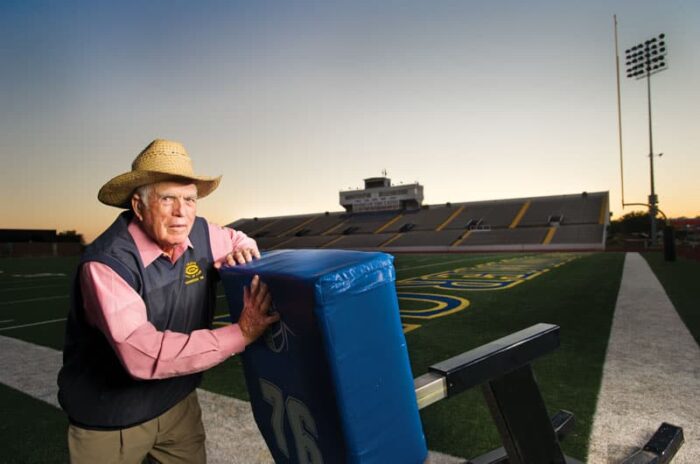Ernest Hawkins: Driven to Win

by Ashley Johnson | Photo by Paul Bryan
It was third-and-five midway through the fourth quarter in the 1972 championship game, and Carson-Newman had just scored against the Lions' defense. After driving up the middle more than 80 times, Coach Ernest Hawkins knew a play action pass was in order. Will Cureton, the Lions' quarterback, faked a run, dropped back and hit Calvin Harris, tight end, on a crossing route to give the team a first down, and successfully keep the ball away from Carson-Newman's offense to secure the NAIA Championship.
“We only threw the ball when we had to, and we always made sure to execute well,” said Ernest Hawkins, the Lions' head football coach from 1964-1985, and the winningest coach in school history with a 132-92-6 record.
For Hawkins, excellent execution at game time began with a tireless quest for perfection on the practice field.
“I became famous for ‘run it again,'” Hawkins said. “We recruited hard-working students. They pushed themselves to be better, and I pushed them harder. We ran stadium steps early in the morning before class, and they challenged each other to get stronger in the off season in the weight room so they would be better individually and as a team. We also helped them academically by ensuring class attendance.”
Hawkins also contributes much of his team's success to the university's decision to embrace integration early on, as well as his cadre of assistant coaches.
“We recruited some outstanding individuals like Autry Beamon, Tim Collins, Dwight White, Harvey Martin, Curtis Wester, and James Thrower who were also great football players,” he said. “A number of them went on to play professionally. None of it would have been possible, however, without a great coaching staff of men like Bobby Fox, Sam McCord and C.W. (Boley) Crawford, Charles Goodall, and graduate assistant Jim Walker.”
However, Hawkins' career with the Lions didn't begin with championships and accolades. After taking on the head coaching job in 1964, Hawkins learned the hard way that 19-year-olds don't always motivate themselves; as a coach, he needed to push them to achieve their full potential.
“After the championship season, I realized how much more talent the team possessed that I never touched. They were that good,” Hawkins said. “It was great watching them pull together to make the 1972 season possible. Nearly 30 years later, they still take the time to call or come by to check on me and my family. I'm proud of them, particularly of what the have accomplished with their lives after graduation.”


